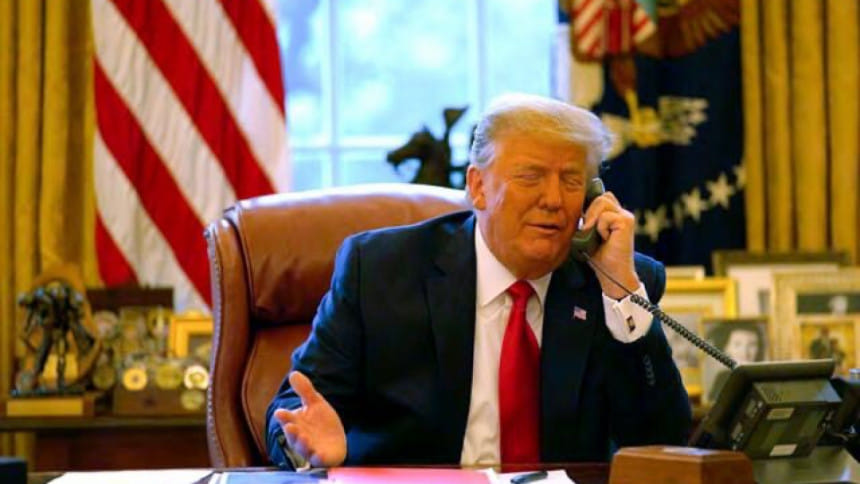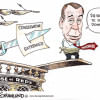Trump’s third indictment shows America’s real national security threat

Donald Trump continues to make history in the most embarrassing sense of the phrase. Last Tuesday, the former President was indicted for the third time in recent months. Never before in the history of the United States has an ex-President running for re-election been criminally charged this many times. And never before has such an awful candidate also had a real chance of becoming President again. The past two indictments have far from dented Trump's support – he still remains the front-runner in the Republican primaries. Not only that, new polling shows that Trump remains competitive in a race with President Joe Biden.
But the latest indictment, unsealed by special counsel Jack Smith, is the gravest of all. More so, it is the most important indictment ever to protect American democracy against anyone. The indictment charges Trump's attempt to subvert the will of voters - and drive the nation to the brink of a coup - as the biggest attack on the "bedrock" of America's basic principles. Whether it will impact Trump's MAGA voter base remains uncertain because let's not fool ourselves here. Trump's track record is as bad as it gets: three times indicted, twice impeached, and deemed liable for sexual assault. But he speaks the nasty and people do like the nasty.
The indictment should instead be viewed as a chilling reckoning for the United States: the biggest national security threat they face today is not in some spy balloon flying across the ocean, but in their own homegrown soil. Their once "exceptional" political system that was able to get rid of a repugnant leader like Richard Nixon after the Watergate scandal simply does not exist anymore.
In many ways, the indictment criminalises disturbing facts we have already known, or either suspected, since the Capitol riots on Jan 6, 2021. We all knew the ballot tampering claims were absurd lies and that Trump "was determined to remain in power." But what makes this case remarkable is the crux of Smith's argument that rests on details after details showing how Trump and his co-conspirators "knew" they were lying when they pursued the voter fraud claims. America's affair with fascism during the last few nightmarish days of Trump's presidency is vividly painted in the 45-page document.
The indictment describes that Trump called his vice president, Mike Pence, "too honest" for refusing to overturn certified election results. A chorus of top Justice Department officials, top White House attorneys and campaign staff members, key state legislators and officials, and state and federal courts had told the former President that his frivolous scheme was untenable. Trump, along with accomplices cheering him on, proceeded to get on with it anyway. The case is expected to unfold with Trump's defense lying on the ground that he did not delusionally believe he was lying.
Most abhorrent of all, the indictment also reveals that Trump and his co-conspirators were indeed aware of inciting violence, that it was not a mere by-product of the conspiracy but a purpose. On 3 January, just days before the riot, a member of the White House counsel's office told Jeffrey Clark, a top Justice Department official at the time, that if Trump tried to remain in office, there would be "riots in every major city in the United States." Clark had responded, "That's why there's an Insurrection Act." The Insurrection Act authorises the President to bring out military troops to quell civil unrest and has only been used a handful of times in the past century. The fact that the Trump-allied lawyer went to such extremes to grab power back in the face of a legitimate election loss shows the depth of corruption that was at play.
Trump's response to the indictment was expectedly inflammatory. His campaign published a statement echoing the classic Trumpian twisted rhetoric: "The lawlessness of these persecutions of President Trump and his supporters is reminiscent of Nazi Germany in the 1930s, and other authoritarian, dictatorial regimes." In the American context, the indictment is really the lowest standard of accountability for Trump's large-scaled anti-democratic acts, and here they are likening a legal process - with a great deal of merit to the allegations – to Nazi Germany. The irony could not be more unreal.
Fending Trump off, even through the three cases, is no easy task. In a better world, Trump would take the insanity plea or just retire and spend the rest of life playing golf. But in the world we live in, we know this headache of a character is going to stall and fight to undermine a trial before the elections. Even if it does go on trial, outcomes offer no definitive respite either because he "can" still run if he's convicted. Even if he goes to prison, he "can" still be elected. No one knows what happens then.
But what we do know is that if Republicans nominate him now – which seems very likely – they'll make an utter mockery of themselves and lose whatever is left of their brand as a legitimate party that cares even an inkling about the core values of the country. If Donald Trump does come back to the White House, after being charged with conspiring to "defraud the United States," then the future of the nation will be unthinkably disastrous. Imagine walls, science denial, xenophobia with a mix of anti-semitism, a high dose of racism, making a vendetta machine out of the Justice department, special counsel Jack Smith definitely losing his job, the corrupt Jeff Clark being appointed as attorney general, a whole lot of white supremacy topped with unthawing the China impasse, and a horde of many more horrible things.
The most realistic best-case – or tolerable – scenario we're looking at seems to be the not-so-fun Biden-Trump rematch where the latter loses and goes on again claiming that he won. And then more indictments and embarrassing history making, where hopefully one day, one stop sign somewhere can put an end to the madness.
Ramisa Rob is a journalist at The Daily Star.

 For all latest news, follow The Daily Star's Google News channel.
For all latest news, follow The Daily Star's Google News channel. 








Comments